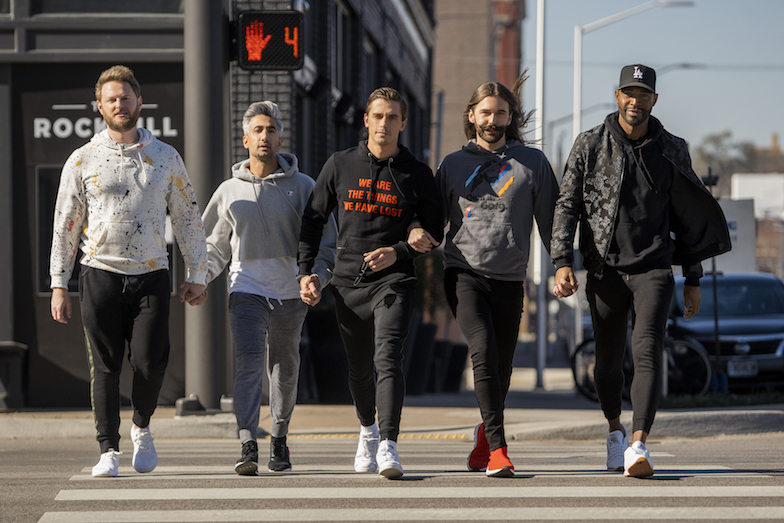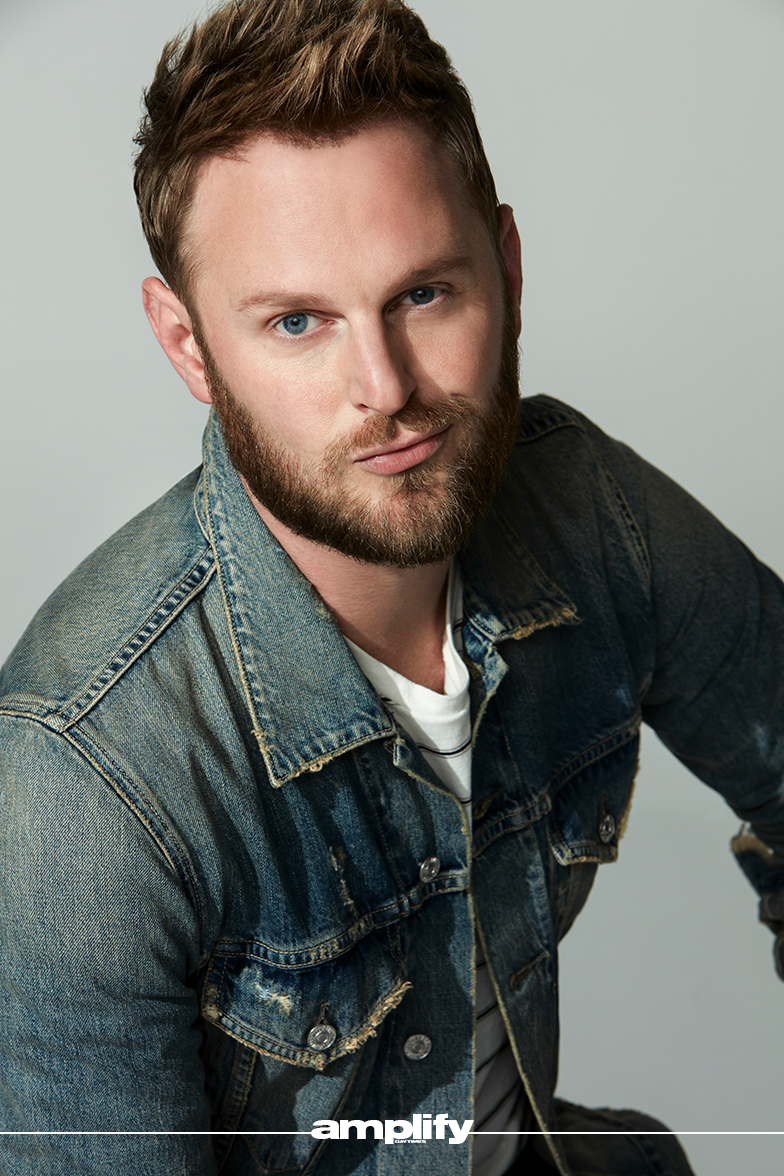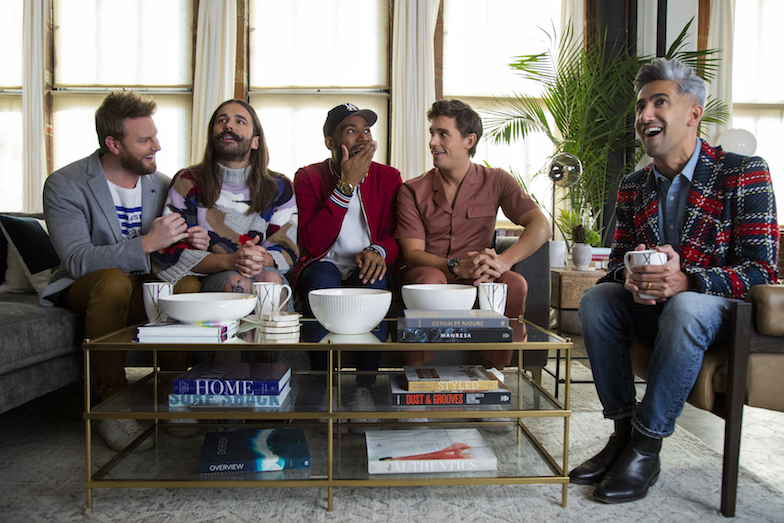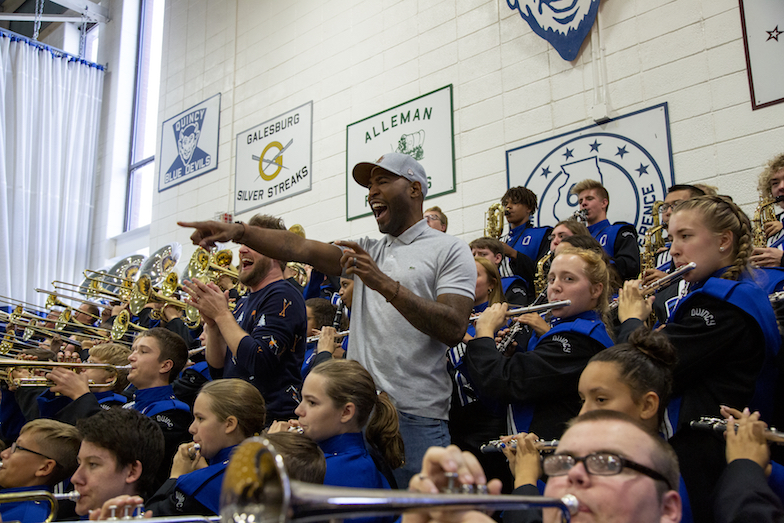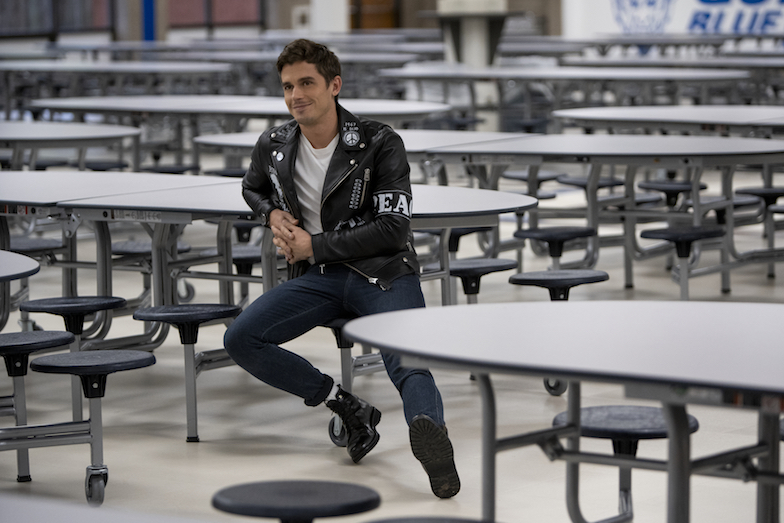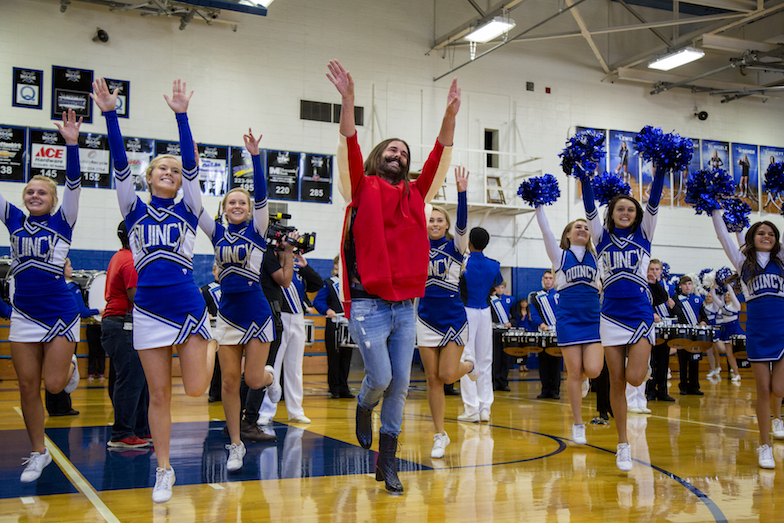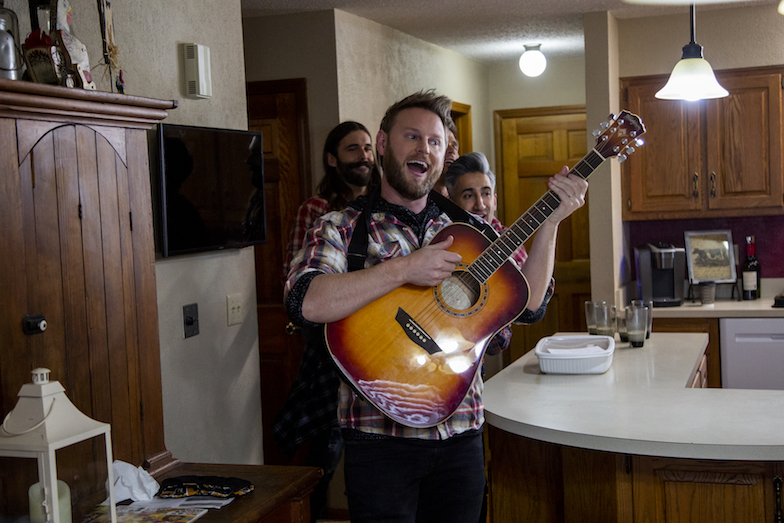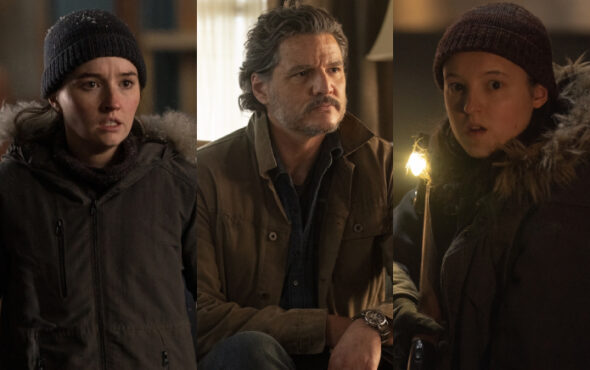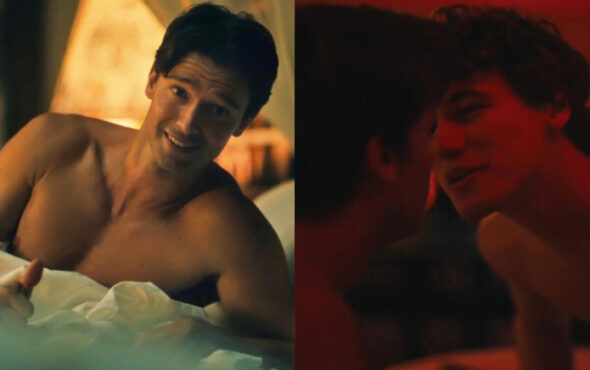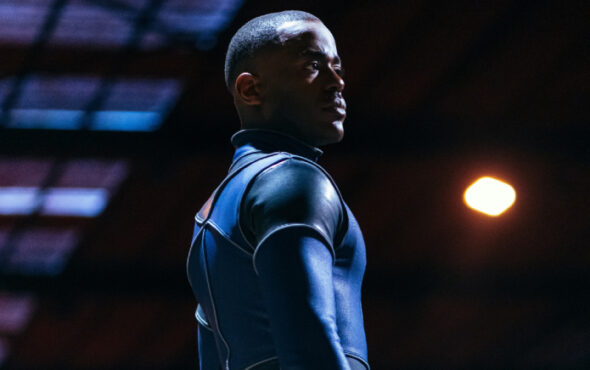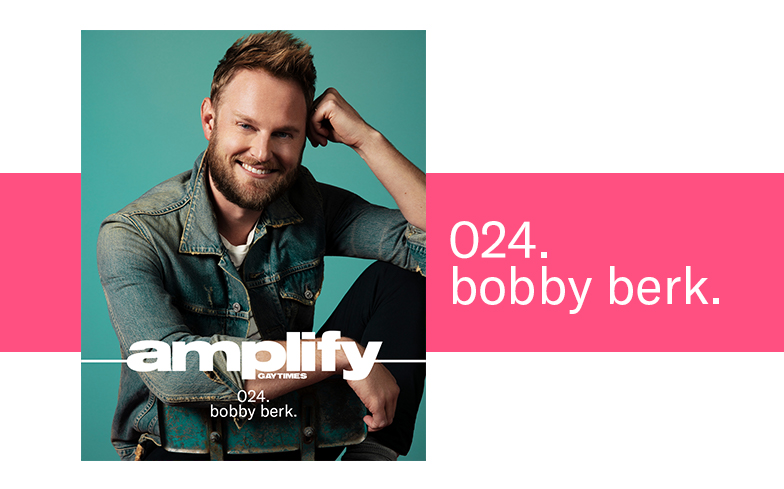
It’s doubtful you’ll meet somebody as busy as Bobby Berk. No really – the Queer Eye interior design expert has a global jet-setting life that’s crazy.
In the 72 hours before we meet, Bobby was in LA, New York and Phoenix. After leaving us – on a trip that included an appearance on national television and a date by Royal appointment, in the company of The Duke and Duchess of Cambridge – he’s casually off to Las Vegas.
Confessing he’s feeling just a tad sleepy (and possibly hungover after partying with Killing Eve star Jodie Comer), Bobby is all ours as we meet to discuss the return of Queer Eye to Netflix with their fourth season, catching up mid-morning at a luxury hotel in Central London. Y’know, a cute place by the river type of vibe.
“Do you enjoy being in the spotlight?” I ask Bobby, pausing to think on his genuine reply. “I think it’s probably the part I struggle with. It was never my plan to be on television or be famous – I didn’t really want to,” he explains, shrugging with honesty.
“Our show attracts the nicest, kindest fans. It’s overwhelming sometimes, but it’s never in a bad way. Everyone is always so nice!”
Adding that while there’s a political divide happening in countries like the USA and UK, a show like Queer Eye offers an escape – with meaning – for people to run with and to. And that includes possibly connecting with people on both sides of the political circle.
“I think one of the biggest reasons and why people have been drawn to it is because both here in the UK and in the States – and I’m sure other countries as well – politically we’re all very divided,” he says. “There’s Brexit and there’s no Brexit, there’s Trump and there’s no Trump.
“To see five LGBTQ people go into very conservative, very religious homes and still be able to talk with each other and be friends with each other, and literally there’s still people we talk to on a weekly basis till today, I think that’s why people resonate with it. Like oh, the world isn’t just about politics, even though it feels like it is right now. It’s about connections between people, and it doesn’t matter what side of the aisle you are on, you can still have that connection and love each other.”
Here, we speak to the design expert about life on one of the biggest queer television hits of our time, why he and the Fab Five are more than just their sexuality, and we find out if Bobby Berk really does do the greatest amount of work on the hit Netflix show. Spoiler alert; he does.
Are we allowed to say that it feels weird saying Queer Eye: Season Four? I just can’t believe it.
Me either! If you think about the fact the show and series one only came out a year and a few months ago, and we’re about to put out four, plus basically five because of Japan even though it’s titled We’re In Japan, it’s five!
Ok so we know that’s happening, but let’s work our way back to that year and a few months ago. How has life changed since episode one aired?
Uhhh, I mean it’s gotten extremely busy. Before, I had my own design firm and furniture firm and so I was busy, but it’s even crazier now. I’ve kept my company and grown that since then so I have my day job still, and then this! It keeps me very busy. In the last 72 hours, I’ve been in LA, New York, Phoenix and London. I’ll go to Las Vegas tomorrow and then get to go home to LA. It’s made me incredibly busy but also opened up so many great opportunities to be able to socialise with the most amazing and talented people in the world.
How did you find your move into the public eye? Do you enjoy being in the spotlight, or is it a struggle all the attention?
Erm… I think it’s probably the part I struggle with. It was never my plan to be on television or be famous – I didn’t really want to. So on the one hand I love it because our show attracts really nice people, so if you’re an asshole, you probably don’t like our show. If you’re a big ol’ homophobe, you probably don’t like our show. Our show attracts the nicest, kindest fans. It’s overwhelming sometimes, but it’s never in a bad way. Everyone is always so nice!
Did you have a moment during that first season when you realised life was about to change, or even had changed, forever?
Radio 1’s Biggest Weekend in Swansea last year. Greg James had us come out for a while and we introduced Olly from Years and Years. We were in the greenroom tent hearing big celebs come on. Like Ed Sheeran would come on and people would cheer, others would. Then we came on and the crowd just went ballistic. I had to hold it together because I almost started crying, and then once we got off stage and Olly started performing, I was down in the pit watching him, bawling. He kept looking at me and then afterwards he was like, ‘Why were you crying when I was singing?’ I was like, ‘Well it was your singing and also it was a very, very emotional moment’. That was the first moment, even in another country, I realised it’s kind of a big deal.
Queer Eye ticks many boxes when it comes to visibility and the people we see on screen. Do you think that’s why people have taken to it so much, and across the globe?
I think one of the biggest reasons and why people have been drawn to it is because both here in the UK and in the States – and I’m sure other countries as well – politically we’re all very divided. There’s Brexit and there’s no Brexit, there’s Trump and there’s no Trump. To see five LGBTQ people go into very conservative, very religious homes and still be able to talk with each other and be friends with each other, and literally there’s still people we talk to on a weekly basis till today, I think that’s why people resonate with it. Like oh, the world isn’t just about politics, even though it feels like it is right now. It’s about connections between people, and it doesn’t matter what size of the aisle you are on, you can still have that connection and love each other.
When people interact with you on social media personally, what’s the one thing they celebrate the most? The reality makeover element or five openly queer people together?
I think what they celebrate the most is how we look for the good in people, even if they don’t see it – and we show them that. I really think the fact that we’re LGBTQ is kind of back here, and that’s where we really want it to be. We don’t want to be defined by our sexuality. We are gay, but that’s not who we are, it’s just part of what we are. I like the fact that people don’t necessarily always focus on, ‘Oh, they’re gay guys’. I’m a designer or a chef or a hairdresser. Yeah… we just happen to be married to men.
I think it’s rare, particularly on television, for people to see queer individuals beyond how they identify. That feels like an important step forward for our community – do you agree?
Absolutely, hopefully that’s where the world is heading in the future is that people don’t look at you based upon your sexuality, but on who you are.
What’s been the greatest reaction you’ve had since Queer Eye first aired, either through social media or in person?
Oh now you’ll make me cry! Erm… I’ve gotten quite a few messages about the first episode of season two, Tammye and the church. I had a pastor reach out to me – I had a pastor slide into my DM’s – and he said in his whole life he’d been taught in church that being gay was immoral, was a choice, paedophiles, they we are going to hell and are awful people. He said to me that in turn, ‘I taught that to my church, and hearing you cry and saying that every single Sunday you begged God to not make you gay – and he didn’t – made me realise that being gay is not the choice I thought it was. You were born that way, God made you that way, and I’ll never preach that hate in my church again’. To hear stories like his over and over and over all the time, that’s been the most impactful thing for me because hopefully now there’s going to be millions of kids out there that don’t have to go through a lot of the self-hate that we were taught when we were kids. That who we are is broken, that we are sick. They can focus on being them instead of trying to pretend to be somebody else.
When you’re going into new homes, is there an element of you that’s still nervous of meeting people who likely have different views, particularly around being LGBTQ?
Absolutely, there’s always a bit of nerves of meeting the new person because we don’t know how they’re going to react. We don’t know how open they’re going to be. There’s some that within five minutes we will be like, ‘Ah fuck, this guy or woman is not going to open up to us’. And then, after a few days, they have. The William Mahnken episode, he lived in the trailer and his wife and him met working at Walmart. After the first ten minutes we met him in the bowling alley, we all got in the car after and were like, ‘God, this is going to be a long week’. He barely said a word, and this guy was not going to give us anything, but it turned out to be one of our favourite episodes. Like, we cracked his shell and turned into being so open and willing to do anything. He let us rip his shirt and do the runway. Yeah, way more open and accepting that we ever expected him to be.
The line up of the Fab Five is hugely popular, but some are calling for the addition of a gay woman or trans person and it becoming the Fab Six. Would you be up for that?
Sure, I’m always up for anything! I do know that it’s already hard enough for five people to get a word in edgeways, so I don’t know how it would work with six. I think it would be near impossible, as it is now. We film a good 40 hours of footage because we all have so much to say, and it gets whittled down – especially in interviews! Everyone on the red carpet always ask what it’s like without the other boys. I’m like, ‘I miss them, but I can talk’.
Controversial statement but does Bobby Berk do the most work out of all the Fab Five?
I think… erm, maybe I definitely have the most labour-intensive? But that’s just my category. Jonathan can do his magic at a chair with his hands, Karamo can do it with his voice and getting inside, and mine is a little more labour-intensive. But I do have a great and amazing team who help me achieve what I accomplish. I was talking to our stylist earlier and she was like, ‘Yeah, it was amazing because in series one it really looked like you were doing all the work because you never really saw the team in the background’. I was like, ‘No, there’s no way, especially in the three days we have to do it. I have a whole army of people that come in and get it done’.
Like you’re good, but that good?
Yeah and that was the thing, season one and two, I was in there doing way more of the labor and painting, and they came out and I saw that I wasn’t in the show because I was off building stuff. By the time we started filming three and four, I let my team do a little more so I’m on the show a bit more.
Queer Eye has taken off with a real young, internet generation of viewers. Are you mindful that you’ve become a role model for young people, particularly those that are LGBTQ, religious or not? And is that pressure something you welcome?
I would say that it is something I struggle with a bit because I don’t necessarily want to be a role model for someone in the religious community, simply because I personally have nothing to do with religion and want nothing to do with religion. But, I don’t really want to say that to people because that’s their decision. I am glad that I can be a role model in the sense that they can see they can see: ‘I can make it through this, I can make it through maybe the hell that I’m going through, the church and the family I’m growing up in. I can come out the other side’. But I never want to be the one to say ‘religion is stupid, you should get the hell away from it’, that’s their decision. But now it’s in print so that’s fine!
What is your message to the young people watching watching Queer Eye?
Oh goodness! I think… just to keep believing in yourself and realise that you’re not broken. That there’s nothing wrong with you and you’re beautifully made exactly the way you are. And that the hate and judgement you are getting in your church sometimes is from ignorance and some man, a thousand years ago, who decided to write a verse in a book a certain way, and that made history – it caused a lot of hate and a lot of torment for a lot of people. If you believe in God and you really believe in love, which is what God represents, it just makes no logical sense that God would feel the way that some do.
Let’s talk about your fellow Fab Five members. What’s been the one thing you’ve learnt the most about them, say someone like Jonathan Van Ness?
I don’t know if there’s anything somebody doesn’t know about him, he’s a pretty open book. Erm… he’s on time now? The amount of places we left him when we were filming one and two because he was always late. The rest of us got sick of being late to set because of him, so we’d leave him – he learnt his lesson. So now, we will come and he will be the first one down. In the last year-and-a-half, Jonathan has become very responsible.
We touched on it slightly before but tell me more about this upcoming new season of Queer Eye. What’s new and what can we expect?
Everyone is always like, ‘What’s the difference between all the series?’ I wouldn’t say there’s anything different as we’re doing the same thing over and over. We’re trying to find somebody that needs help in business or in their life or is down on their luck. We do, for the first time, get to help a farm which – I grew up in Missouri, a farm in Missouri – so that was a lot of fun.
Have we moved to a new city?
It’s still in Kansas City. We will usually shoot two seasons in one city, it makes sense as I have to build out of a loft so I’d have to build out every eight episodes which is not only impossible time wise but be very expensive, so we usually stick in one city for two seasons. And… I’m literally blanking on what happened.
It’s amazing is what you’re saying, basically?
Yes, it is!
Are we going to cry?
Yes, of course.
Are we going to fall in love with you even more?
Even more!
You’ve also shot episodes of Queer Eye out in Japan. Is that another example of when you realised how global the show now is?
Yeah like Japan I fully remember because it’s recent! The first episode of the Japan series I would say is my favourite episode we’ve ever done. Japanese culture, they don’t really hug and we are big huggers. Five of us, huge personalities, burst into this woman’s home. She doesn’t speak any English, she does not know what’s going on and the translator is trying to keep up with all five of us, and we are just hugging her – her name is Yoko. She’s the cutest and is smiling and hugging. Fast forward to the end of the episode when her best friend who nominated her sees her makeover and her home, and Yoko comes over and gives her a hug. It’s the first time they’ve ever hugged in their entire life and her friend kind of took a step back, went back in and hugged her – they just stood there hugging and giggling and laughing, and going, ‘This feels so good, this feels so natural. Why haven’t we been hugging our whole lives?’ They just kept hugging each other and we were bawling our eyes out; we take hugs for granted. And that was a continuing theme of every single episode. All our heroes would comment, ‘When the Fab Five would hug me, I would feel like everything was going to be okay and everything is going to work out.’ And they were like, ‘Why don’t we hug here?’ I feel like hopefully we are going to change Japanese culture, one hug at a time. And soon, everyone in Japan will be walking down the street hugging each other. That was one of my most favourite moments in Japan, realising the power of a hug.
Was it interesting to experience and personally learn about the LGBTQ community in Japan? The country is progressive, but our community has steps to take.
They are and they aren’t. The thing about Japanese culture is that it’s not really accepted to be gay there – at all. But they’re so polite, they don’t say anything. We worked with a gay guy on the show, one of them was our hero, and we’d ask if people ever made nasty comments and he was like, ‘No, no, everyone is always really polite, but it’s the looks and stares.’ The Japanese are very good at saying a thousand words with just a look or moan… Before we thought Japan was going to be an utter disaster. Like, why are they sending us here? There’s such a language barrier, there’s such a cultural barrier – there wasn’t. The moment we stepped in there and met Yoko, the emotional connection that we had – that I didn’t think we were going to be able to have. I think it was actually more because we spoke a different language, so when we’d standing there while they translated and we’d be staring into each other’s eyes – we’d start crying. We’d be having the most emotional connection of not saying a word to each other but staring into each other’s soul. We’d start holding each other for no reason, neither of us knew what was going on. It was a really emotional connection.
You’ve done the USA, Australia and Japan. Next could you please come to the UK?
Oh we’d love to and I know Tan France would. Tan is begging constantly to come here. It’s literally just a matter of time; when we have time. We’ve been kept quite busy lately but we’d love to come over here and do a little mini series.
What’s the one thing you’d want to change about our British homes?
Less doilies.
Why don’t you like them?
Why, you do?!
I’m not offended by them.
They’re very grandma.
I suppose my nana does have one…
Yeah and I haven’t been in a lot of British homes… I have a lot of British hotels.
It can be flowery wallpaper and painted ceilings. I think you’d hate it, to be honest.
Yeah that doesn’t sound like me, I definitely more modern and minimalist. That’s not what I think of when I think of British design.
And finally… what’s the one thing about Bobby Berk that audiences don’t know but you’d like them to?
That I’m way more outgoing and funny than people think!
You are, I can vouch for that!
My translator when I was in Japan, she was always laughing at me. I was literally like, ‘I love you, you think I’m so funny’. She was like, ‘You’re actually the funniest. Watching the show, I never would have expected that, but now I know that people just can’t hear you over the others when you’re being funny.’
Queer Eye returns for season four, debuting 19 July on Netflix.
Photography Netflix
Words William J Connolly
